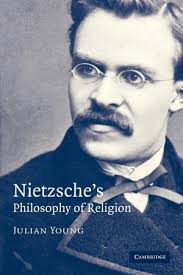- Home
- Recommended Readings
- Book Review
Book Review
-
Nietzsche’s Philosophy of Religion By Julian Young
Reviewed by Horst Hutter
You may download the entire book review as Adobe PDF format clicking PDF icon on the left. If you need some clarifications about copyright or usage rights, please contact us at nceditors@ietzschecircle.com.
 Every student of Nietzsche in the Anglophone world should read this book. It is a most able treatment of a much-ignored
and much-misunderstood topic close to the very heart of the writings of this seminal thinker. As such, it offers much needed corrections to the many misinterpretations of Nietzsche that have found currency, especially
among “professional” philosophers and especially within the analytical tradition. It completely disposes of the notion that Nietzsche was an a-political thinker that favored an amoral or even immoral concern
with the enhancement of great individuals at the expense of the “herd”, and the fascistic subjugation and enslavement of the majority of human beings. Most misinterpretations no longer commit the egregious error of linking Nietzsche with Nazism, an error that seems to have been definitively overcome by the judicious labors of Walter Kaufmann.
Yet they seem to follow Kaufmann in assigning Nietzsche’s thinking to merely private concerns that essay a restoration of human greatness for some individuals at a complete distance from any concerns with the lives of the many.
They also pay no attention to the contradictory rhetoric of Nietzsche, his negations of established morality and his attempt to design new cultural modes by these very negations.
Every student of Nietzsche in the Anglophone world should read this book. It is a most able treatment of a much-ignored
and much-misunderstood topic close to the very heart of the writings of this seminal thinker. As such, it offers much needed corrections to the many misinterpretations of Nietzsche that have found currency, especially
among “professional” philosophers and especially within the analytical tradition. It completely disposes of the notion that Nietzsche was an a-political thinker that favored an amoral or even immoral concern
with the enhancement of great individuals at the expense of the “herd”, and the fascistic subjugation and enslavement of the majority of human beings. Most misinterpretations no longer commit the egregious error of linking Nietzsche with Nazism, an error that seems to have been definitively overcome by the judicious labors of Walter Kaufmann.
Yet they seem to follow Kaufmann in assigning Nietzsche’s thinking to merely private concerns that essay a restoration of human greatness for some individuals at a complete distance from any concerns with the lives of the many.
They also pay no attention to the contradictory rhetoric of Nietzsche, his negations of established morality and his attempt to design new cultural modes by these very negations.
They thus ignore the “medical” character of Nietzsche’s writings. These begin in a diagnosis of the disease of Western culture, its nihilism, continue to an understanding of the moment of “neutralitas” in which the culture as the patient hovers between a worsening of the condition and the beginning of a slow recovery, and then move to designing techniques for healing this condition identified as nihilism. They pay no attention to the fact that Nietzsche provides theorems for both diagnosis and cure, and that his main concern is with a politics of cultural healing. Hence, they cannot make sense of the contradictory nature of his writings, which they aim to reduce to logical consistency, and not finding this, they frequently come to the judgment that Nietzsche was a bad philosopher or no philosopher at all. This whole procedure is usually supported by a systematic neglect of the visionary continuities in the totality of Nietzsche’s writings, by focusing exclusively on the Genealogy, the only book in which Nietzsche supposedly “did serious philosophy.”
Julian Young’s book not only avoids all of the above erroneous interpretations, but also actively opposes and criticizes them. Focusing on all of Nietzsche’s published writings, with only occasional references to the Nachlass, he traces a continuity in Nietzsche’s thinking that goes from The Birth of Tragedy to his last publications, such as Ecce Homo. This continuity is constituted by a very profound understanding of religion, community and the transitory nature of modern atheisms, as well as the need for developing new visions of the divinity with a festival and communitarian theology. Thus, Young argues that Nietzsche’s thinking is “…communitarian thinking in the sense that the highest object of its concern is the flourishing of the community as a whole. And second, it is religious thinking in that it holds that without a festive, communal religion, a community—or, as Nietzsche frequently calls it, a ‘people’—cannot flourish, indeed cannot properly be said to be a community.” (1) Similarly, the social totality is not “…valued for the sake of higher types. Rather, the higher types are valued for the sake of the social totality.”(3) And this community, potentially a cosmopolitan world community, is to be governed as a pluralistic system in which unity is forged out of multiplicity.
While most scholars would admit the validity of the above for The Birth of Tragedy, Young considers that Nietzsche never abandoned these concerns, but made them the central points of all of his writings to the very end. He arrived at these startling conclusions based on teaching a graduate seminar that covered all of Nietzsche’s published writings. He demonstrates his thesis convincingly by analyzing every book and every essay of Nietzsche, with the exception of the early lectures. Nietzsche thereby aimed to overcome nihilism by both sketching the decline of Christianity and by looking forward to the creation of a new form of religiosity. This would address the central existential concerns of humanity, such as the riddles of death and pain, the problem of social cohesion and the new religiosity’s support for a new morality, as well as showing how to resolve the central problem of human willing by erecting heroic role models. It would also infuse the mystery of life with a new allegorical and mythological horizon. Young emphasizes that what Nietzsche wanted was new kinds of political leaders, motivated by the ‘gift-giving Virtue” and thus able to avoid becoming despotic priests, interested only in power and thus cynically telling ignoble lies. Nietzsche’s attack on the metaphysics of truth may be seen as a way of undermining rulers who tell noble “lies”, in which the lie-teller does not believe and from the content of which he remains cynically distant.
Young further argues that Nietzsche’s vision of a healthy society is a vision of a hierarchically organized society, created, embodied and preserved by an ethos of a communal religion, which makes Nietzsche’s vision in a broad sense a political vision, “…of the shape and structure of a healthy polis” (179). Nietzsche thereby very much follows in the footsteps of Plato, as well as imitating Plato in giving a “medical” cast to all of his thinking. This new community would require a new disciplined hierarchy in the soul, to which the efforts of Nietzsche’s primarily intended readers, namely free spirits, would contribute by appropriate self-shaping and appropriate philosophical legislation at propitious moments in the future.
Overall, this is a much-needed book coming at the right time in the English speaking reception of Nietzsche. Its minor drawbacks (in the opinion of this reader), are an often-exaggerated emphasis on logical flaws in Nietzsche’s reasoning, a focus on a propositional concept of philosophy, an emphasis on Nietzsche’s supposed Lamarckism, as well as a neglect of any connection between Nietzsche’s suffering and his thinking. These, however, are largely outweighed by its supreme virtues as a sympathetic, truthful and largely correct account of the central concerns of this much debated and much mis-used thinker.
All content copyright © Horst Hutter - Nietzsche Circle. All Rights Reserved.
-
Thus Spoke ZarathustraBy Friedrich NietzscheA new translation by Graham Parkes
Oxford University Press, 2005
Reviewed by Horst HutterThis new translation of Nietzsche’s magnum opus is by far the best available in the English language. It should find its way to the desk of all students who do not have access to the original German.
-
Nietzsche's New DarwinismBy John Richardson
University of Illinois Press, 2005
Reviewed by Bradley Park (St. Mary's College of Maryland)"...The strength of Richardson’s book is that it does not merely discuss the influence of Darwin’s thought on Nietzsche or catalog points of similarity and difference"
Featured in the Agonist
-
Nietzsche, Music, and Silent Suffering An Introduction
By Yunus Tuncel, The New School University, New York City
...Focus on the impact of Nietzsche's knowledge of music on his philosophy and the development of his thought.
-
Music, Posthumanism and Nietzsche
By Stefan Lorenz Sorgner, Erlangen-Nuernberg
...the first order Empfindung associated to music is the dissolution of individuality which from a posthumanist[1] perspective brings about the realisation of the embeddedness of human beings in this world. Hence, music can bring about more than pain and pleasure in the recipients.
Subscribe
To receive site updates, news, and announcement from NC via email. To do so, you simply need to provide your email address below.





